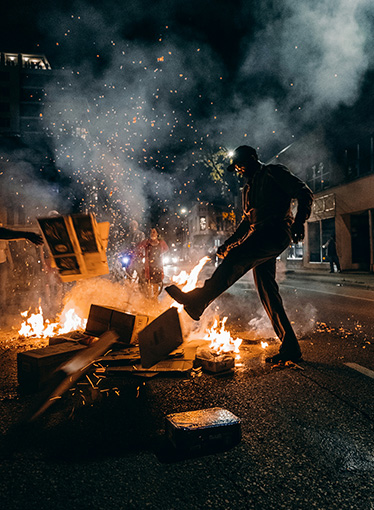Evacuations from High-Risk Locations Call +44 (0)1202 308810 or Contact Us →

Protests in Tunisia Turn Violent and Ongoing Security Concerns
10 Jan 2018
Anti-austerity protests across Tunisia, most notably overnight on 08 and 09 January, have escalated into violence. Initially peaceful demonstrations turned to looting and clashes between security forces and the public. Police fired rubber bullets and tear gas at protestors in the capital, Tunis, where the French supermarket, Carrefour was stormed by protestors who attempted to set it alight.
Key Points
- Several areas of Tunisia have been struck by anti-austerity protests since the New Year.
- Hundreds have been arrested and at least one protestor has been killed. Damage has also been reported to buildings and infrastructure in the country.
- Opposition leaders have called for continued protests.
Situational Summary
Civil Unrest: Anti-austerity protests across Tunisia, most notably overnight on 08 and 09 January, have escalated into violence. Initially peaceful demonstrations turned to looting and clashes between security forces and the public. Police fired rubber bullets and tear gas at protestors in the capital, Tunis, where the French supermarket, Carrefour was stormed by protestors who attempted to set it alight.
At least one death (the government have questioned the death’s relation to the unrest) has been reported, more than 200 have been arrested, and 49 police officers have been wounded across the country. Beyond the capital, noteworthy unrest also occurred in Tebourba, where hundreds took to the streets after the funeral of the individual killed in the protests. Demonstrations have been reported in 20 cities in total, including Gafsa, Kasserine, and in Sidi Bouzid, the third of which was the site of the catalyst of the 2011 Arab Spring uprisings. Further damage to buildings and infrastructure has been observed, including a Jewish cultural centre on the tourist resort island of Djerba, which was firebombed (though no casualties were reported).
SOLACE GLOBAL COMMENT
It should also be noted that protests are more common in January in Tunisia, as locals commemorate the 2011 revolt which saw the fall of the dictator. However, these protests occurred as a result of surging prices across Tunisia. The government have struggled to put its finances in order and attract foreign investment. Protests were reported last week as a result of tax increases and spending cuts included in the 2018 budget. Constraints have been imposed by the International Monetary Fund (IMF) in return for a $2.9 billion loan. Unemployment and inflation in the country remain stubbornly high. The unemployment rate in 2017 hovered around 15 per cent, while inflation rose to 6.4 per cent in December 2017.
Opposition leaders have called on people to continue to take to the streets and peacefully protest against the budget; further unrest is likely with continued violence probable. Unsurprisingly the government has called for calm. The opposition has vowed to continue demonstrations until the government drops its 2018 budget. The country’s youth unemployment rate increases the likelihood of further unrest; more than 25 per cent of the country’s youth are jobless.
These protests serve as the most serious threat to stability in the country since the formation of Chahed’s government in 2016. However, despite certain comparisons with the 2011 Arab Spring uprisings, these demonstrations have not yet reached the size of those seen seven years ago. While some of conditions – high unemployment (especially youth joblessness), austerity measures, the presumed heavy handedness of security forces, strong labour unions, and a government having to juggle the needs of multiple constituencies – appear highly likely to persist, there appears to be no imminent catalyst for revolutionary change. This being said, there remains the possibility that this unrest may spread and escalate, causing the government to fall. Tunisia has suffered from fractured political leadership since the removal of dictator Zine El Abidine Ben Ali in 2011.
Unrest in countries across the region has frequently acted to create a permissive environment for extremists or insurgent groups. This is facilitated by a number of factors, including the redeployment of security forces to address the unrest, rather than to conduct counter-terrorist or security tasks. Tunisian forces frequently uncover arms caches and detain terror suspects, demonstrating such cells remain active in the country, and may seize on the opportunities provided by unrest. The fire-bombing of a Jewish cultural centre in Djerba may demonstrate an early example of this; no protests were reported in the vicinity, and the unrest has, so far, lacked an overtly religious element.
SECURITY ADVICE
Civil UnrestModerateIt is strongly recommended that protests are avoided. It is likely police will use aggressive measures to disperse demonstrators. Moreover, political gatherings may initially seem peaceful but can escalate quickly into violence, as recent events have shown. It would be advisable for travellers to maintain a low profile in the short-term and monitor local events.
Travellers in Tunisia should also note that there is also an increased threat of crime and terrorism as security forces are required to refocus their attention on containing the unrest. Travellers should therefore maintain an enhanced level of awareness, even if not in immediate proximity to protests.
For all travel to Tunisia, Solace Global would advise that clients employ a prearranged, locally-vetted driver and an airport meet and greet as a minimum security precaution. For certain areas of the country, it may be advisable to enhance this level of security. All travellers are advised to utilise travel tracking and intelligence software in order that employers may effectively exercise duty of care, and travellers can be informed about changes in their security environment and inform others of emergencies.